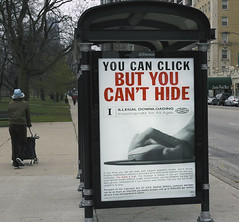Pirates of the song-ripping, not Somali, variety.
Cory Doctorow passes along word that a draft version of an international agreement on copyright law has leaked, as have earlier documents from the hush-hush negotiations over what's called the Anti-Counterfeiting Trade Agreement.
Officials from the U.S., Japan, Switzerland and other countries have been hammering out the details of the trade agreement in far-flung places for the last five years or so. Round six -- with the participation of Obama's U.S. Trade Representative Ron Kirk -- happening this week in South Korea. What the draft text says about a new global regime for "Internet distribution and information technologies" is, says Cory, "very bad." And you can certainly make a strong argument that what's being debated this week would move forward the current front line of the copyright wars.
You can also make a good case that that's exactly why we're seeing this latest battle in the copyright wars playing out in secured conference rooms in Seoul rather than in front of C-SPAN cameras in the Senate. Congress, for all of Orrin Hatch's musings about blowing up computers, has stopped short of turning such aggressiveness into law. ACTA, then, takes a top-down approach. ACTA would get done at the level of international law something copyright interests like the RIAA, MPAA, and some software firms have wanted for years. It would do away with an understanding we have in the U.S. about the Internet: that, generally speaking, the networks and platforms that make up the online world (whether that's TimeWarner Cable or YouTube) have some protections against being held liable for what people post onto their services, like swapping songs they don't have the rights to.
Here's where the ACTA approach brings to mind how '80s-era mandatory sentencing for drug crimes came to be such a mess. Drug reform advocates wanted some sort of standardization on what had been the chaotic enforcement of drug laws. Short and consistent terms, the thinking went, would benefit overworked courts and defendants. After a zealous Congress got done with the idea, though, we had uniformly draconian sentencing laws that judges came to despise. Copyright enforcement, especially online, is similarly fuzzy. Internet companies get caught in the ambiguity. So ACTA offers what seems to be a tempting escape hatch.
The agreement that seems to be on the table in Seoul would give Internet services a safe harbor that protects them against what's called intermediary liability. That's arguably a positive step -- only to get there, the Internet services would be required to enact a mandatory zero-tolerance policy against copyright infringement. They have to agree to filter copyrighted material and strip infringing content from their networks. And more than that, Internet service providers would have to set up their services in a way that allows them to cut off copyright-infringing customers, a step they've fought against. (That tactic even goes by the name "three strikes and you're out.") That's a drastic, speech-limiting step that even Congress has shied away from.
That's why they call it the copyright "wars." And actually, it's reasonable to even tease out this whole war on drugs analogy further. You can argue that there's some similar cultural blending at work here. Like how Nixon and his team purposely grouped the marijuana beloved by long-haired counterculturalists with heroin and cocaine without much public consensus, the international agreement on the table lumps in illegal song-sharing -- rightly or wrongly -- with big global problems like counterfeit pharmaceuticals and even the big business of fake handbags. It's strategic for copyright interests to have all those things bundled together if and when it's time for Congress to have its say on the matter.
--Nancy Scola
(Photo credit: swanksalot)




